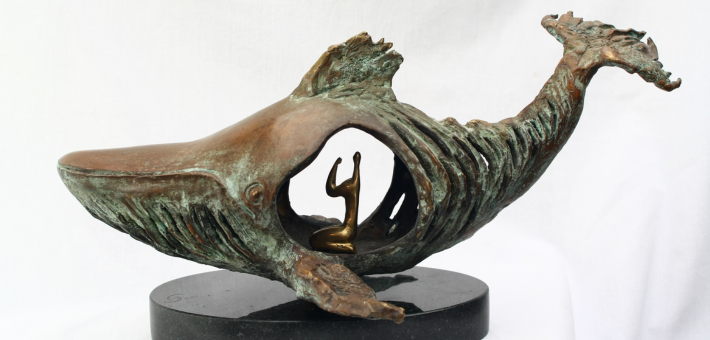Commentary on Jonah 1:1-17; 3:1-10; [4:1-11]
The book of Jonah could be described as equal parts parable and slapstick routine.
On the one hand, it is a prophetic tale with many paradigmatic elements, and can be understood to bring into focus important theological questions: What is the nature of prophetic calling? Are humans free to resist the will of God? Does God change God’s mind? What is the role of human repentance? And how do foreign nations figure in God’s plans?
What Jonah is not is the historical report of a real prophet. Rather, it is part of a long history of basically fictional tales written and preserved by ancient scribes, such as Ahiqar and Wenamun. The content and style of these stories vary, but in general, tales in the genre seem to be reflections on how (and how not) to live. And although they are broadly entertaining, they seem to have been ideally aimed at a courtly audience of more-or-less educated people, who might even travel to foreign lands like the main characters do. The aforementioned stories also all contain serious theological messages alongside their other content.
From this standpoint, it is clear Jonah is an antihero; this is manifest from the beginning: Called to go north and east to Nineveh, he instead goes down to Jaffa and hops on a ship to Tarshish. The location of Tarshish is still not certain—guesses include Tartessus in Spain near Gibraltar, and Carthage—but in any case, it is the wrong direction.1 One does not sail from Jaffa to Nineveh.
Prophetic call stories constitute a genre, and they tend to follow an expected trajectory. In a typical call story, some resistance is expected (for example, Exodus 3:11, 13; 4:1, 10), but this one in Jonah doesn’t even get started. Jonah is a kind of anti-Isaiah; rather than saying, “Send me!” (Isaiah 6:8), Jonah runs away.
The comic aspects of the story ramp up once Jonah is on the ship. The Lord doesn’t merely send a storm; he hurls it (1:4). And as the mighty storm rages, Jonah isn’t just indifferent; he is in a deep sleep below deck. There may be an irony here in that this sort of sleep elsewhere is used for a trance state in which divine revelation is possible (Daniel 8:18; 10:9), but no such thing is happening here.
The sailors quickly determine that Jonah is the cause of the danger, and suddenly the frightened fugitive is a powerful sermonizer—“I worship the LORD, the God of heaven, who made the sea and the dry land!” (1:9)—and a selfless martyr who invites them to throw him overboard to preserve their own lives (1:12). Despite his comic traits, Jonah is also portrayed throughout the story as one who knows God, and he seems to know there is no real point in fleeing.
It is a shame that the lectionary omits the colorful psalm of lament in Jonah 2, in which the belly of the “large fish” that swallows Jonah is compared to the underworld (“the Pit,” 2:6). In keeping with his general knowingness, Jonah praises the Lord for saving him even before it happens (2:7–9).
Jonah, spat out on the land by the fish, gets a second chance, and interestingly, this time it is worded differently: This time the Lord doesn’t give him the gist of the message in advance. In fact, when Jonah cries out, “Forty days more, and Nineveh shall be overthrown!” (3:4), it is not entirely clear that he has been told to say this. But in any case, his experience continues to be the mirror image of Isaiah’s: Whereas Isaiah is not heeded (Isaiah 6:9–10), Jonah is.
Not only do Ninevites believe Jonah, but their (unnamed) king proclaims that all in the city will fast and put on sackcloth—even the herds and flocks. This strikes the reader as a fairly serious commitment, economic and otherwise, since surely the sackcloth garments for sheep and cattle had to be created in a bespoke manner. (The author knows of no other examples in the ancient world of animals fasting or wearing sackcloth.) This great show of repentance from such a great city makes an impression on the Lord, who just as quickly changes his mind (3:10).
The dramatic conversion of foreign rulers is a major theme of the Daniel court tales (Daniel 2:46–47; 3:28–29; 4:34–37; 6:26–27) and, to some extent, of the Joseph cycle as well (Genesis 41:39–40). In general, the book of Jonah seems quite optimistic about the breadth of the divine plan and its potential inclusion of foreigners. The idea that God includes foreign nations in his salvation is not unique among the prophetic books, of course (for example, Isaiah 2:2–4; 19:18–25; Amos 9:7), but the expression of hope for Assyria is always striking given that it was one of the greatest historical enemies of Israel and Judah and was, in some cases, a symbolic cipher for an evil nation even after it faded from the international scene (for example, Ezekiel 31–32; Zechariah 10:11).
The repentance of Nineveh might seem like a happy ending—the word of the Lord is heeded, the people are spared, et cetera. But Jonah does not see it that way. Rather, he throws a fit: “That is why I fled to Tarshish at the beginning; for I knew that you are a gracious God and merciful, slow to anger, and abounding in steadfast love, and ready to relent from punishing!” (4:2). He sounds a bit like Samuel, who was annoyed that God changed his mind about Saul (1 Samuel 15:11, 35), to the point that he flatly denied it (15:29). In Jonah, the prophet’s frustration is even less sympathetic to many readers since the decision is a gracious one.
The Lord tries to cheer Jonah up as one might a petulant toddler, with soothing words and a bit of shade, but this too turns into an object lesson about the divine power to grant and take away mercies, and finally Jonah wishes to die—again, a somewhat comic echo of the more serious death wishes of Moses (Numbers 11:15) and Job (Job 3).
As befits a comic character, it is not clear that Jonah has learned anything by the story’s end. God, however, has learned something about the Ninevites. These foreigners, “who do not know their right hand from their left” (4:11), have shown faith and obedience where even a prophet like Jonah did not. (At the very end, he is still marveling about those animals in sackcloth.) In the broader conversation about the status of foreigners vis-à-vis Judah and its god during the Persian Period (for example, Ezra-Nehemiah; Isaiah 56:1–8), the author of Jonah brings an optimistic perspective.
Notes
- Jonah is said in 2 Kings 14:25 to be from Gath-hepher, a small town just north of Nazareth. If this same tradition is assumed by the book’s author, then Jaffa is almost precisely 180 degrees in the wrong direction.
PRAYER OF THE DAY
God of the seas, sky, and land,
When Jonah turned to run from you, you showed him that nothing and no one could hide from your presence. You are in all things, and you love all things. Show us the gift of your presence, and help us to carry your word of compassion and grace to all the world, in the name of the one who carried out your love flawlessly, Jesus Christ our redeemer. Amen.
HYMNS
Wash, O God, our sons and daughters ELW 445, UMH 605
Will you come and follow me ELW 798
Forgive our sins as we forgive ELW 605, H82 674, UMH 390
CHORAL
Down in the river to pray, arr. J. David Moore


November 10, 2024